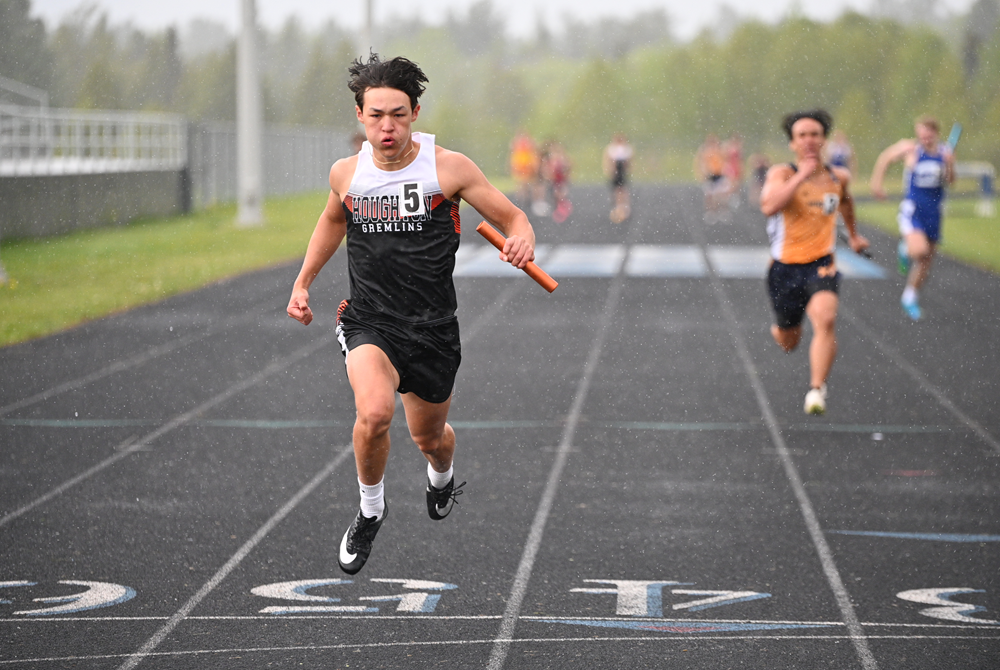
Casting Lines for Future Tournaments
August 12, 2016
By Jack Roberts
MHSAA Executive Director
The MHSAA is best known to the public for the tournaments it conducts to conclude the fall, winter and spring seasons each school year.
These tournaments, the first and largest program of the MHSAA, have survived the Vietnam War, the Korean conflict and two World Wars. They have survived the technology bubble, the housing collapse, the energy crisis and the Great Depression.
MHSAA tournaments existed at the dawn of aviation and at the time of our nation’s lunar landing. Popes, presidents and governors have changed and changed again and again, and MHSAA tournaments roll on year after year.
But the sense of tradition and permanence and inevitability of MHSAA tournaments doesn’t dissuade us from asking questions about our tournaments, even some of the most basic questions. Here are two.
Question #1
I have long been and will always be an advocate for a Ryder Cup format for the MHSAA Golf Finals, and a team tennis approach to the MHSAA Tennis Finals; but 90 years of tradition is hard to overcome. Might this be a more exciting format? Could it be co-ed? Could it reverse the decline in boys tennis participation, and increase girls golf participation? Wouldn’t it be fun to try?
Periodically, the International Olympic Committee requires each of the designated Olympic sports to defend its status, to state its case why the sport should remain a part of the Olympic program. Then, after a series or votes that retain one sport at a time, the IOC drops the sport that makes the weakest case. It does so to make room for one of the previously unlisted sports that makes the best case for inclusion.
This would appear to keep the existing Olympic sports on their toes, and to keep the Olympic movement fresh and reflective of modern trends in sports.
While I would not enjoy the controversy, I can see the potential for some positive results if the MHSAA were to invoke the same policy for determining the 14 tournaments it will provide for girls and the 14 for boys.
This might cause us to consider more deeply what a high school sport should look like, or at least what an MHSAA tournament sport should stand for.
On the one hand, we might be inclined to drop tournaments for those sports that involve mostly non-faculty coaches and non-school venues, or require cooperative programs to generate enough participants to support a team, or resort almost entirely to non-school funding, or cater to individuals more than teams.
Or perhaps this process would cause policymakers to forget traditional thinking and ask: “In this day and age, should we shake off traditional notions of sport and consider more where modern kids are coming from?” That might mean fewer team sports and more individual sports, more “extreme” sports like snowboarding and skateboarding, and more lifetime sports, meaning not just golf and tennis and running sports, but also fishing and even shooting sports.
Currently, MHSAA policy states that the MHSAA will consider sponsorship of a tournament series for any sport which 64 member schools conduct on an interscholastic basis as a result of action by the governing boards of those schools.
Should the only question be how many schools sponsor a sport, or must an activity also have certain qualities and/or avoid certain “defects?” What should an MHSAA tournament sport look like and stand for?
Question #2
Bristling from criticism that his association is a money-grabbing exploiter of children, my counterpart in another state said, “If we were running our programs just to make money, we would do very many things very differently.” I knew exactly what he meant.
Because we care about the health and welfare of students, because we mean what we say that the athletic program needs to maximize the ways it enhances the school experience while minimizing academic conflicts, and because we try to model our claim that no sport is a minor sport when it comes to its potential to teach young people life lessons, we operate our programs in ways that make promoters, marketers and business entrepreneurs laugh, cry or cringe.
If money were the only object, we would seed and select sites to assure the teams that attracted the most spectators had the best chance to advance in our tournaments, regardless of the travel for any team or its fan base. If money were the only object, we would never schedule two tournaments to overlap and compete for public attention, much less tolerate three or four overlapping events. If money were the only object, we would allow signage like NASCAR events and promotions like minor league baseball games.
Those approaches to event sponsorship may not be all wrong; they’re just not all right for us. And we will live with the consequences of our belief system.
During a typical school year, more than 20 percent of the MHSAA’s 2,097 District, Regional and Final tournaments lose money. Not a single site in golf, skiing or tennis makes a single penny. In no sport did every District, Regional and Final site have revenue in excess of direct expenses.
In fact, in only three sports – boys and girls basketball and football – is revenue so much greater than direct expenses overall that it helps to pay for all the other tournaments in which the MHSAA invests.
That’s right: invests. When we present our budget to our board, we talk about the MHSAA’s investment in providing tournament opportunities in all those sports and all those places that cannot sustain the cost of those events on their own. How much is this investment worth to students, schools and society?
These two are core questions that require our focus far in advance of talk about scheduling, site selection, seeding and the myriad matters that too often hijack our time and attention.

Houghton Teams Sweep at Invitational to Honor Longtime Coach, Teacher
By
John Vrancic
Special for MHSAA.com
May 31, 2024
HOUGHTON — Dan Juntilla more than likely would have enjoyed a day like this past Tuesday at Houghton High School.
 Although the former Houghton boys track & field coach couldn’t be there in person, he was probably enjoying the sunny and seasonably cool afternoon in spirit during the third annual memorial invitational held in his honor.
Although the former Houghton boys track & field coach couldn’t be there in person, he was probably enjoying the sunny and seasonably cool afternoon in spirit during the third annual memorial invitational held in his honor.
“He was a special guy,” current Houghton boys head coach Erik Johnson said. “I had the privilege to coach with Dan, and this is something which would have been special to him. He was always there for everybody.”
The Gremlins dominated this year’s version of the Dan Juntila Memorial Invite with 250 points. They were followed by Negaunee with 86 and Dollar Bay with 74.
“Dan was such a nice guy,” Dollar Bay coach Ben Tampas said. “He wanted to see everybody do well. Even if his team won, Dan was quick to point out how well everybody did. During the coaches’ meetings, he always had a quick joke to lighten everything up. He wanted to keep everything from getting too serious. He was always willing to answer your questions. He never turned his back on anyone. He was always willing to help. He would have loved this, too.”
The Houghton girls also won with 118½ points. Calumet was runner-up at 104 and Negaunee, which brought a partial team, placed third with 86.
Juntilla, who died unexpectedly on Jan. 9, 2022, graduated in 1970 from Wakefield High School where he was class president and lettered in football, basketball, tennis and track.
He lettered in football at Michigan Tech and earned a master’s degree in social work, counseling and secondary education at Northern Michigan University.
Juntilla coached track and football for decades at Houghton, where he taught English and local history.
“Dan was my coach when I was a freshman,” Gremlins’ senior Brody Mattila said. “He had a lot of influence on our program. This is a real special day.”
Mattila, who will be attending the University of Michigan on an academic scholarship this fall, won the 110-meter hurdles in a school-record 15.26 seconds, long jump at 19 feet, 8½ inches, and anchored the winning 400 relay (45.74) in his final home meet.
“I was excited when I found out I got the record,” he said. “I’ve been shooting for this all year. We had perfect conditions, and my warm-ups went great. I’m looking forward to the U.P. (Division 1) Finals (Saturday at Kingsford).”
Mattila’s hurdles record was one of at least five set Tuesday.
“This was another good day for us,” Johnson said. “Our 3,200 relay has been strong all year, and Brody setting the record in the 110s helped set the tone. We’ve struggled in shot put and discus for many years, but this year we’ve been doing quite well. The field events have been coming through for us. Everybody was stepping up.”
Chassell junior Kalvin Kytta took the boys 3,200 in a school-record 10:08.69, and West Iron County senior Danica Shamion collected four victories, setting school records in three of her races.
“It has always been my goal to go under 10 minutes in the 3,200,” Kytta said. “This takes some of the pressure off for Saturday. Now I can just go after a sub-10.”
Shamion set records in the 200 (25.79), 400 (56.74) and high jump (5-5) and captured the 100 (12.75).
“Running in the 56s in the 400 was my goal since last year’s U.P. Finals,” she said. “This feels amazing. I had a Hancock girl (senior Brielle Kero) right beside me, and it was close all the way. She really pushed me. Getting the 200 record is also something I wanted to do for some time, and I’ve been working on high jump a lot. This takes a lot of the pressure off, but I still have one more high school meet left and I’m going to give it my all. I’m not done. I’m not stopping now.”
Kero was runner-up in the 200 (26.73) and 400 (58.92).
Juntilla also served as a Little League coach, hockey manager and a mentor to many and was recognized by the MHSAA for 40 years as a registered game official as he refereed basketball at the high school, middle school and elementary school levels.
 John Vrancic has covered high school sports in the Upper Peninsula since joining the Escanaba Daily Press staff in 1985. He is known most prominently across the peninsula for his extensive coverage of cross country and track & field that frequently appears in newspapers from the Wisconsin border to Lake Huron. He received the James Trethewey Award for Distinguished Service in 2015 from the Upper Peninsula Sportswriters and Sportscasters Association.
John Vrancic has covered high school sports in the Upper Peninsula since joining the Escanaba Daily Press staff in 1985. He is known most prominently across the peninsula for his extensive coverage of cross country and track & field that frequently appears in newspapers from the Wisconsin border to Lake Huron. He received the James Trethewey Award for Distinguished Service in 2015 from the Upper Peninsula Sportswriters and Sportscasters Association.
PHOTO Houghton's Brody Mattila crosses the finish line during a downpour in the 400 relay at the Western Peninsula Athletic Conference championship meet May 22 in Ishpeming. (Photo by Cara Kamps.)

